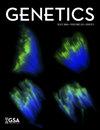Premature endocycling of Drosophila follicle cells causes pleiotropic defects in oogenesis.
IF 3.3
3区 生物学
引用次数: 0
Abstract
Endocycling cells grow and repeatedly duplicate their genome without dividing. Cells switch from mitotic cycles to endocycles in response to developmental signals during the growth of specific tissues in a wide range of organisms. The purpose of switching to endocycles, however, remains unclear in many tissues. Additionally, cells can switch to endocycles in response to conditional signals, which can have beneficial or pathological effects on tissues. However, the impact of these unscheduled endocycles on development is underexplored. Here, we use Drosophila ovarian somatic follicle cells as a model to examine the impact of unscheduled endocycles on tissue growth and function. Follicle cells normally switch to endocycles at mid-oogenesis. Inducing follicle cells to prematurely switch to endocycles resulted in lethality of the resulting embryos. Analysis of ovaries with premature follicle cell endocycles revealed aberrant follicular epithelial structure and pleiotropic defects in oocyte growth, developmental gene amplification, and the migration of a special set of follicle cells known as border cells. Overall, these findings reveal how unscheduled endocycles can disrupt tissue growth and function to cause aberrant development.果蝇卵泡细胞的过早内循环会导致卵子发生的多向性缺陷。
内循环细胞在不分裂的情况下生长并重复复制其基因组。在多种生物的特定组织生长过程中,细胞会根据发育信号从有丝分裂周期切换到内循环周期。然而,在许多组织中,切换到内循环的目的仍不清楚。此外,细胞还可根据条件信号转入内循环,这可能对组织产生有益或有害的影响。然而,这些计划外的内循环对发育的影响尚未得到充分探索。在这里,我们以果蝇卵巢体细胞卵泡细胞为模型,研究计划外内循环对组织生长和功能的影响。卵泡细胞通常在卵子生成中期转入内周期。诱导卵泡细胞过早转入内周期会导致胚胎死亡。对过早出现卵泡细胞内循环的卵巢进行分析,发现卵泡上皮结构异常,卵母细胞生长、发育基因扩增和被称为边界细胞的特殊卵泡细胞迁移方面存在多向性缺陷。总之,这些发现揭示了计划外的内周期如何扰乱组织生长和功能,从而导致发育异常。
本文章由计算机程序翻译,如有差异,请以英文原文为准。
求助全文
约1分钟内获得全文
求助全文
来源期刊

Genetics
生物-遗传学
CiteScore
6.20
自引率
6.10%
发文量
177
期刊介绍:
GENETICS is published by the Genetics Society of America, a scholarly society that seeks to deepen our understanding of the living world by advancing our understanding of genetics. Since 1916, GENETICS has published high-quality, original research presenting novel findings bearing on genetics and genomics. The journal publishes empirical studies of organisms ranging from microbes to humans, as well as theoretical work.
While it has an illustrious history, GENETICS has changed along with the communities it serves: it is not your mentor''s journal.
The editors make decisions quickly – in around 30 days – without sacrificing the excellence and scholarship for which the journal has long been known. GENETICS is a peer reviewed, peer-edited journal, with an international reach and increasing visibility and impact. All editorial decisions are made through collaboration of at least two editors who are practicing scientists.
GENETICS is constantly innovating: expanded types of content include Reviews, Commentary (current issues of interest to geneticists), Perspectives (historical), Primers (to introduce primary literature into the classroom), Toolbox Reviews, plus YeastBook, FlyBook, and WormBook (coming spring 2016). For particularly time-sensitive results, we publish Communications. As part of our mission to serve our communities, we''ve published thematic collections, including Genomic Selection, Multiparental Populations, Mouse Collaborative Cross, and the Genetics of Sex.
 求助内容:
求助内容: 应助结果提醒方式:
应助结果提醒方式:


